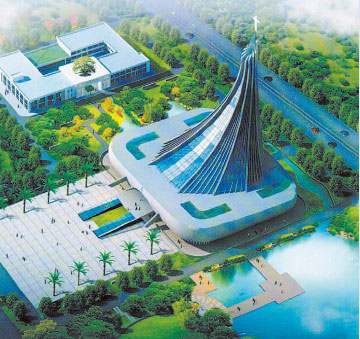


Effect picture of Christian theme park allegedly sponsored by the government of Changsha, Central China's Hunan Province. [Photo: Baidu]
Chinese netizens expressed outrage over a large Christian theme park allegedly sponsored by the government of Changsha, Central China's Hunan Province, claiming that government should not encourage religious practices in a secular country that separates religion and politics.
The park in Changsha Xingsha Ecological Park, which covers an area of 150,000 square meters, is the largest Christian theme park in central and south China, reported Hunan Dushi, a local TV station based in Changsha.
A Christian church and Bible institute were built in the park, Chen Zhi, president of the Christian Council of Hunan Province, was quoted as saying by the TV station. The church will begin operations in June 2017, said the report.
Dai Rihong, the representative of the ecological park's construction team, was quoted by Changsha Evening News as saying that the park was designed as a romantic wedding park for citizens to shoot wedding photos.
The Changsha government website said the Xingsha Ecological Park was a government-sponsored project, and was subcontracted to the Huashun Construction Project Management Co.
Neither the Church nor Huashun could be reached for comment as of press time.
A resident who lives nearby said that the park opened during the 2017 Spring Festival and welcomed some tourists, mostly families.
Meanwhile, netizens expressed their outrage over the Christian-themed park, especially after learning that the local government subsidized the project.
Sina Weibo user "youguocaiyoujia" wrote that the government should be alert to the penetration of religious ideas that contradict China's mainstream ideology, which might pose a threat to political security.
Another Weibo user named "sanxiaren" said Hunan is the birthplace of Chairman Mao Zedong and a sacred place like this would never tolerate the overflowing of religion.
Many local governments are struggling for progress during industrial transformation, and religion is being used for cultural and tourist development, Zhang Yiwu, a professor and cultural scholar at Peking University, told the Global Times.
However, local governments should be cautious about religious and ethnic issues, and should take into consideration their social impact and those projects should avoid conflicting with the mainstream ideology, Zhang added.
A report released during the 9th National Chinese Christian Congress in 2013 showed that more than 2.4 million Protestants in the Chinese mainland were baptized from 2007-12, with experts saying that more people are turning to religion for help and spiritual consolation.
The report also said that 5,195 churches had been built or renovated from 2007-12.
However, cities such as Wenzhou and Hangzhou in East China's Zhejiang Province have demolished Christian churches during the province's campaign to renovate the region.
 Fire brigade in Shanghai holds group wedding
Fire brigade in Shanghai holds group wedding Tourists enjoy ice sculptures in Datan Town, north China
Tourists enjoy ice sculptures in Datan Town, north China Sunset scenery of Dayan Pagoda in Xi'an
Sunset scenery of Dayan Pagoda in Xi'an Tourists have fun at scenic spot in Nanlong Town, NW China
Tourists have fun at scenic spot in Nanlong Town, NW China Harbin attracts tourists by making best use of ice in winter
Harbin attracts tourists by making best use of ice in winter In pics: FIS Alpine Ski Women's World Cup Slalom
In pics: FIS Alpine Ski Women's World Cup Slalom Black-necked cranes rest at reservoir in Lhunzhub County, Lhasa
Black-necked cranes rest at reservoir in Lhunzhub County, Lhasa China's FAST telescope will be available to foreign scientists in April
China's FAST telescope will be available to foreign scientists in April "She power" plays indispensable role in poverty alleviation
"She power" plays indispensable role in poverty alleviation Top 10 world news events of People's Daily in 2020
Top 10 world news events of People's Daily in 2020 Top 10 China news events of People's Daily in 2020
Top 10 China news events of People's Daily in 2020 Top 10 media buzzwords of 2020
Top 10 media buzzwords of 2020 Year-ender:10 major tourism stories of 2020
Year-ender:10 major tourism stories of 2020 No interference in Venezuelan issues
No interference in Venezuelan issues
 Biz prepares for trade spat
Biz prepares for trade spat
 Broadcasting Continent
Broadcasting Continent Australia wins Chinese CEOs as US loses
Australia wins Chinese CEOs as US loses